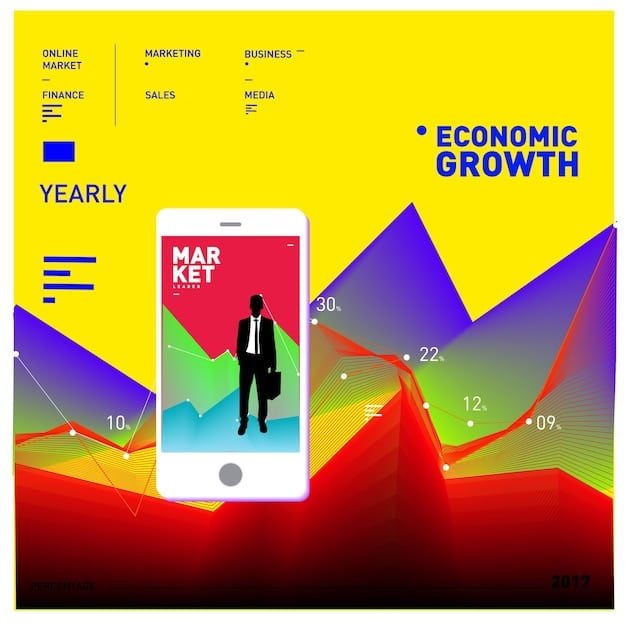The Impact of Social Media on Business Marketing: Strategies & Sales Growth

Social media’s impact on business marketing and sales is profound, offering unprecedented opportunities for brand building, customer engagement, and revenue generation through targeted advertising, content marketing, and direct sales channels.
The digital landscape has been reshaped by social media, profoundly impacting how businesses approach marketing and sales. The modern business leverages platforms like Facebook, Instagram, and LinkedIn to connect with customers, build brand awareness, and drive sales. Understanding the impact of social media on business marketing and sales is no longer optional but a necessity for survival and growth in today’s competitive market.
Understanding the Social Media Marketing Revolution
Social media has revolutionized marketing by providing businesses with direct access to their target audience. This shift has transformed traditional marketing strategies, allowing for personalized communication and real-time feedback. The ability to gather customer data, analyze trends, and tailor marketing campaigns accordingly has become a game-changer for businesses of all sizes.
The Rise of Social Commerce
Social commerce, the integration of e-commerce functionality within social media platforms, has emerged as a powerful force. It allows customers to discover, browse, and purchase products without leaving their favorite social apps. This seamless shopping experience has significantly increased conversion rates and simplified the buying process.
Data-Driven Decision Making
One of the most significant impacts of social media on marketing is the availability of vast amounts of data. Businesses can now track key metrics such as engagement rates, click-through rates, and conversion rates to measure the effectiveness of their campaigns. This data-driven approach enables marketers to make informed decisions, optimize strategies, and maximize ROI.
- Enhanced Customer Engagement: Social media fosters direct interactions between businesses and customers, creating a sense of community and loyalty.
- Targeted Advertising: Platforms offer sophisticated tools for targeting specific demographics, interests, and behaviors, ensuring marketing efforts reach the right audience.
- Real-Time Feedback: Businesses can quickly respond to customer inquiries, address concerns, and adapt their strategies based on immediate feedback.

In summary, social media’s impact on business marketing extends beyond simple promotion. It encompasses data-driven decision-making, enhanced customer engagement, and the rise of social commerce, all contributing to a more dynamic and responsive marketing landscape.
Building Brand Awareness Through Social Media
Brand awareness is crucial for business success, and social media provides unparalleled opportunities to enhance it. Consistent and engaging content on social platforms can significantly increase brand visibility, build a strong brand reputation, and foster customer loyalty. Leveraging social media for brand building involves a strategic approach that aligns with the brand’s values and target audience.
Content Marketing Strategies
Content marketing plays a pivotal role in building brand awareness on social media. High-quality, relevant, and engaging content attracts attention, educates the audience, and establishes the brand as an authority in its industry. Content formats such as blog posts, videos, infographics, and podcasts can be tailored to suit different platforms and audience preferences.
Influencer Marketing
Influencer marketing has become an increasingly popular strategy for building brand awareness. Collaborating with influencers who have a significant following and a strong reputation can amplify the brand’s message and reach a wider audience. When choosing influencers, it’s essential to ensure their values align with the brand’s and that their audience matches the target demographic.
- Consistent Branding: Maintaining a consistent brand identity across all social media platforms reinforces brand recognition and builds trust.
- Engaging Visuals: Using eye-catching visuals, such as images and videos, can capture attention and create a memorable brand experience.
- Interactive Content: Interactive content, such as polls, quizzes, and contests, encourages audience participation and increases brand engagement.
In conclusion, building brand awareness through social media requires a strategic approach that encompasses content marketing, influencer collaborations, and consistent branding. By leveraging these strategies effectively, businesses can significantly enhance their brand visibility and foster lasting customer relationships.
Driving Sales Through Social Media Marketing
Beyond brand awareness, social media is a powerful tool for driving sales. With the right strategies, businesses can convert social media followers into paying customers and increase revenue. This involves optimizing social media profiles for conversions, running targeted advertising campaigns, and leveraging social commerce features.
Social Media Advertising
Social media advertising allows businesses to reach a highly targeted audience with personalized ads. Platforms like Facebook, Instagram, and LinkedIn offer advanced targeting options based on demographics, interests, behaviors, and more. This ensures that ads are shown to potential customers who are most likely to be interested in the product or service.
Optimizing Social Profiles for Conversions
Optimizing social media profiles for conversions involves making it easy for followers to become customers. This includes adding clear calls-to-action, providing links to the website or online store, and showcasing product or service offerings. A well-optimized social profile can serve as a landing page that drives traffic and generates leads.

- Leveraging Social Commerce: Integrating e-commerce features within social media platforms allows customers to make purchases directly without leaving the app.
- Running Contests and Promotions: Contests and promotions can incentivize followers to make a purchase and increase brand engagement.
- Using Customer Testimonials: Sharing positive customer testimonials and reviews can build trust and encourage potential customers to make a purchase.
In summary, driving sales through social media marketing requires a strategic approach that includes targeted advertising, profile optimization, and leveraging social commerce features. By implementing these tactics effectively, businesses can turn social media followers into paying customers and boost their bottom line.
Measuring the ROI of Social Media Marketing
Measuring the return on investment (ROI) of social media marketing is essential for justifying marketing spend and optimizing strategies. Tracking key performance indicators (KPIs) such as engagement rate, reach, website traffic, and conversion rate can provide valuable insights into the effectiveness of social media efforts.
Key Performance Indicators (KPIs)
Key performance indicators (KPIs) are metrics that indicate the success of social media marketing activities. These include engagement rate (likes, comments, shares), reach (number of unique users who saw the content), website traffic (number of visitors driven from social media), and conversion rate (percentage of visitors who complete a desired action, such as making a purchase).
Analytics Tools
Various analytics tools are available to help businesses track and measure the ROI of their social media marketing efforts. Platforms like Google Analytics, Facebook Insights, and Twitter Analytics provide detailed data on audience demographics, engagement metrics, and conversion rates. These tools enable marketers to make data-driven decisions and optimize their strategies for maximum impact.
- Setting Clear Goals: Defining specific, measurable, achievable, relevant, and time-bound (SMART) goals is crucial for measuring ROI effectively.
- Tracking Conversions: Monitoring the number of leads, sales, and revenue generated from social media is essential for determining the financial return on investment.
- Analyzing Data: Regularly analyzing social media data and insights can reveal trends, identify areas for improvement, and inform future marketing strategies.
In conclusion, measuring the ROI of social media marketing involves tracking key performance indicators (KPIs), utilizing analytics tools, and setting clear goals. By understanding the financial return on their social media investments, businesses can make informed decisions and optimize their strategies for maximum effectiveness.
The Future of Social Media in Business
The future of social media in business is set to be even more integrated and transformative. Emerging technologies such as artificial intelligence (AI), augmented reality (AR), and virtual reality (VR) are poised to revolutionize social media marketing and sales. As social platforms continue to evolve, businesses must adapt their strategies to stay ahead of the curve.
Artificial Intelligence (AI)
Artificial intelligence (AI) is already playing a significant role in social media marketing. AI-powered tools can automate tasks such as content creation, scheduling, and customer service. AI algorithms can also analyze vast amounts of data to identify trends, personalize marketing messages, and predict customer behavior.
Augmented Reality (AR) and Virtual Reality (VR)
Augmented reality (AR) and virtual reality (VR) offer immersive experiences that can enhance brand engagement and drive sales. AR allows customers to overlay digital content onto the real world, while VR creates fully immersive virtual environments. These technologies have the potential to transform how businesses interact with their customers on social media.
- Personalized Experiences: Social media is becoming increasingly personalized, with AI algorithms tailoring content and recommendations to individual users.
- Video Content: Video content continues to dominate social media, and businesses are leveraging short-form videos, live streams, and interactive videos to engage their audience.
- Social Commerce Evolution: Social commerce is evolving beyond simple product listings, with platforms integrating advanced features such as augmented reality try-ons and virtual shopping experiences.
In summary, the future of social media in business is characterized by increased personalization, the dominance of video content, and the evolution of social commerce. By embracing emerging technologies and adapting their strategies accordingly, businesses can harness the full potential of social media to drive growth and success.
Addressing Challenges and Risks in Social Media Marketing
While social media offers immense opportunities for businesses, it also presents challenges and risks that must be carefully managed. These include dealing with negative feedback, maintaining brand reputation, ensuring data privacy, and staying compliant with regulations. A proactive approach to risk management is essential for mitigating potential harm and maximizing the benefits of social media marketing.
Dealing with Negative Feedback
Negative feedback is inevitable on social media, and how businesses respond to it can significantly impact their brand reputation. Addressing complaints promptly and professionally, offering solutions, and showing empathy can turn a negative experience into a positive one. Ignoring or deleting negative comments can backfire and damage customer trust.
Maintaining Brand Reputation
Maintaining brand reputation on social media requires constant monitoring and proactive management. Responding to crises quickly, addressing misinformation, and engaging in transparent communication can help protect the brand’s image and build customer loyalty. It’s also essential to have a crisis communication plan in place to handle potential PR disasters.
- Data Privacy: Protecting customer data and complying with privacy regulations is crucial for maintaining trust and avoiding legal penalties.
- Compliance with Regulations: Staying up-to-date with advertising standards, consumer protection laws, and other relevant regulations is essential for ensuring ethical and legal marketing practices.
- Monitoring and Responding to Security Threats: Social media accounts are vulnerable to hacking and security breaches, so businesses must implement robust security measures and monitor their accounts for suspicious activity.
In conclusion, addressing challenges and risks in social media marketing requires a proactive approach to risk management, including dealing with negative feedback, maintaining brand reputation, ensuring data privacy, and complying with regulations. By implementing these strategies effectively, businesses can mitigate potential harm and maximize the benefits of social media marketing.
| Key Point | Brief Description |
|---|---|
| 📣 Brand Awareness | Enhance visibility through consistent and engaging content. |
| 📈 ROI Measurement | Track KPIs like engagement and conversion using analytics tools. |
| 🛒 Social Commerce | Integrate e-commerce for direct purchases in-app. |
| 🤖 Future Trends | AI and AR offer personalized, immersive experiences. |
Frequently Asked Questions
Social media enhances brand awareness by increasing visibility and reach. Consistent, engaging content helps brands connect with a broader audience and build recognition.
Key metrics include engagement rate (likes, comments, shares), reach (unique viewers), website traffic from social media, and conversion rates (sales, leads generated).
Businesses can use social commerce features to enable direct purchases within social platforms. Targeted ads and promotions can also drive sales by reaching potential customers.
AI automates content creation, scheduling, and customer service. AI algorithms analyze data to personalize marketing, predict customer behavior, and optimize campaigns.
Address complaints promptly, offering solutions and showing empathy. Ignoring or deleting negative comments can damage customer trust, so a proactive response is crucial.
Conclusion
In conclusion, the impact of social media on business marketing and sales is undeniable. By leveraging social platforms strategically, businesses can build brand awareness, engage with customers, drive sales, and measure their ROI. Embracing the future trends and managing the challenges, businesses can harness the full potential of social media to achieve sustainable growth.